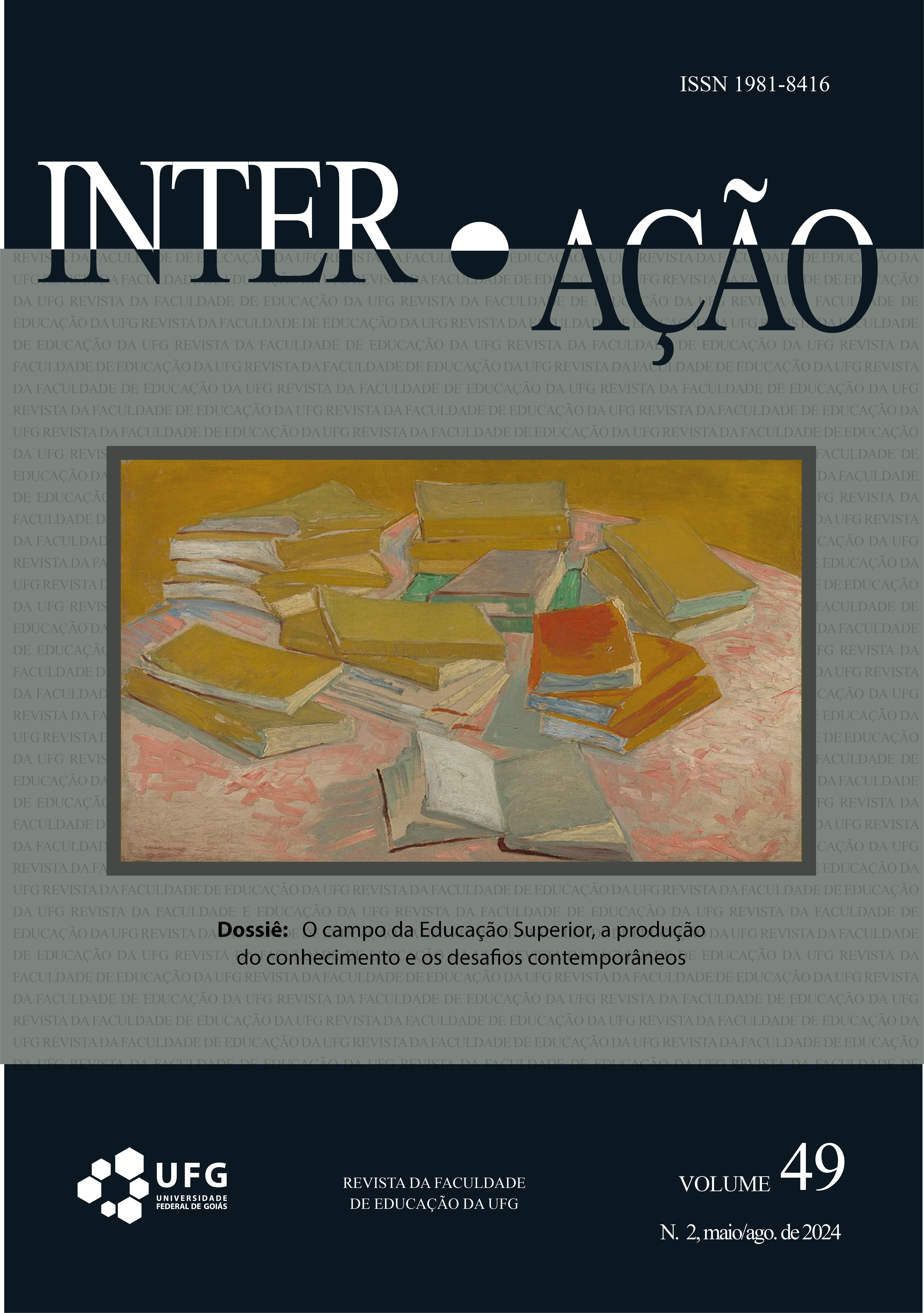ENSINO SUPERIOR E BARBÁRIE: REFLEXÕES A PARTIR DE MICHEL HENRY E SUA FENOMENOLOGIA DA VIDA
DOI:
https://doi.org/10.5216/ia.v49i2.79176Palavras-chave:
Barbárie; Ensino Superior; Michel Henry; Fenomenologia da Vida.Resumo
As reflexões presentes resultam de um estudo sobre a fenomenologia da vida, de Michel Henry. O objetivo deste artigo visou analisar argumentos fundamentais de Henry no contexto da barbárie no Ensino Superior e a decorrente contextualização de atuais desafios à docência. O percurso metodológico de tal análise se deu por meio de pesquisa teórico-bibliográfica, com apropriação conceitual da teoria henriana sobre a fenomenologia e sua crítica à dimensão científica hipertrofiada, imposta historicamente à Universidade a partir da obra A barbárie, cujos conceitos centrais foram cotejados com textos de comentadores. Os resultados alcançados por meio da presente análise demonstram a paulatina exclusão de elementos significativos da vida subjetiva no espaço acadêmico, impulsionada por um crescente protagonismo das forças tecnoeconômicas e midiáticas, acarretando o diagnóstico de um processo de destruição da Universidade como espaço humano da cultura, por excelência. Concluiu-se, nesse sentido, como grande desafio para a educação superior na atualidade, a construção de uma consciência crítica sobre as questões diagnosticadas por Henry, através da proposição de uma prática docente que retome a primazia da vida subjetiva no cotidiano acadêmico.
Downloads
Referências
BARROS, Neide Celia Ferreira. O movimento Escola sem Partido e a popularização do ódio aos docentes. Em Tese, Florianópolis, v. 18, n. 2, p. 142-167, 2021. Disponível em: https://periodicos.ufsc.br/index.php/emtese/article/view/78349. Acesso em: 26 abr. 2024.
FEYERABEND, Paul. Contra o método. Trad. Octanny S. da Mota e Leônidas Hegenberg. Rio de Janeiro: F. Alves, 1977.
GALEANO, Eduardo. El libro de los abrazos. México: Siglo Veintiuno Editores, 2017.
HAN, Byung-Chul. Sociedade do cansaço. Trad. Enio Paulo Giachini. Petrópolis: Vozes, 2015.
HENRY, Michel. A barbárie. Trad. Luiz Paulo Rouanet. São Paulo: É Realizações, 2012.
PAGNUSSAT, Janessa; GRZIBOWSKI, Silvestre. A ressignificação da cultura a partir da revolução científica: um estudo a partir da fenomenologia de Michel Henry. Aufklärung, João Pessoa, v.7, n.3., Set.¬ Dez., 2020, p. 203¬-212. Disponível em: https://doi.org/10.18012/arf.v7i3.52802. Acesso em: 21 abr. 2024.
SEVERINO, Antônio Joaquim. Expansão do ensino superior: contextos, desafios, possibilidades. Avaliação, Campinas; Sorocaba, SP, v. 14, n. 2, p. 253-266, jul. 2009. Disponível em: scielo.br/j/aval/a/N6mSpvQz9XYr4K7Xcdzv3mD/?format=pdf. Acesso em: 22 abr. 2024.
ZYLBERSZTAJN, Arden. Galileu: um cientista e várias versões. Caderno Catarinense de Ensino de Física, v. 5 (Número Especial), p. 36-48, 1988.
Publicado
Como Citar
Edição
Seção
Licença
Copyright (c) 2024 Marcelo Leandro dos Santos

Este trabalho está licenciado sob uma licença Creative Commons Attribution-NonCommercial 4.0 International License.
A Inter-Ação utiliza como base para transferência de direitos a licença Creative Commons Attribution 4.0 para periódicos de acesso aberto (Open Archives Iniciative - OAI). Por acesso aberto entende-se a disponibilização gratuita na Internet, para que os usuários possam ler, baixar, copiar, distribuir, imprimir, pesquisar ou referenciar o texto integral dos documentos, processá-los para indexação, utilizá-los como dados de entrada de programas para softwares, ou usá-los para qualquer outro propósito legal, sem barreira financeira, legal ou técnica.
Autores que publicam neste periódico concordam com os seguintes termos:
1) Autores mantém os direitos autorais e concedem à revista o direito de primeira publicação, com o trabalho simultaneamente licenciado sob a Licença Creative Commons Attribution que permite o compartilhamento do trabalho com reconhecimento da autoria e publicação inicial nesta revista.
2) Autores têm autorização para assumir contratos adicionais separadamente, para distribuição não-exclusiva da versão do trabalho publicada nesta revista (ex.: publicar em repositório institucional ou como capítulo de livro), com reconhecimento de autoria e publicação inicial nesta revista.
3) Autores têm permissão e são estimulados a publicar e distribuir seu trabalho online (ex.: em repositórios institucionais ou na sua página pessoal) a qualquer ponto antes ou durante o processo editorial, já que isso pode gerar alterações produtivas, bem como aumentar o impacto e a citação do trabalho publicado.















